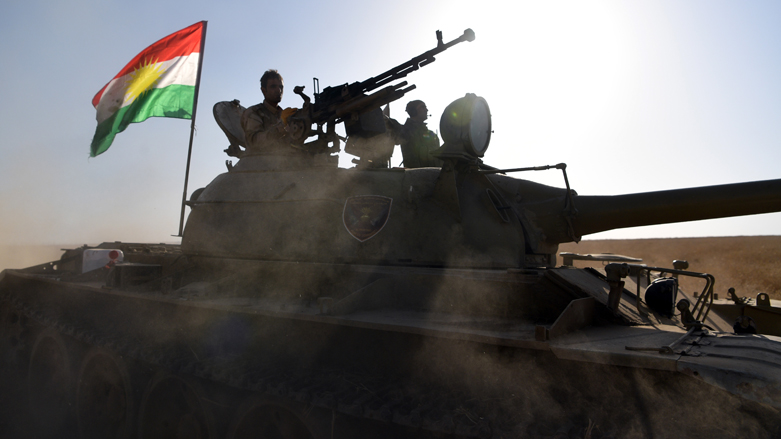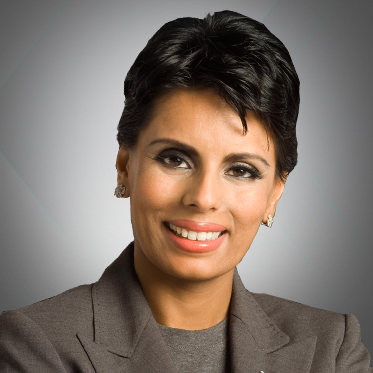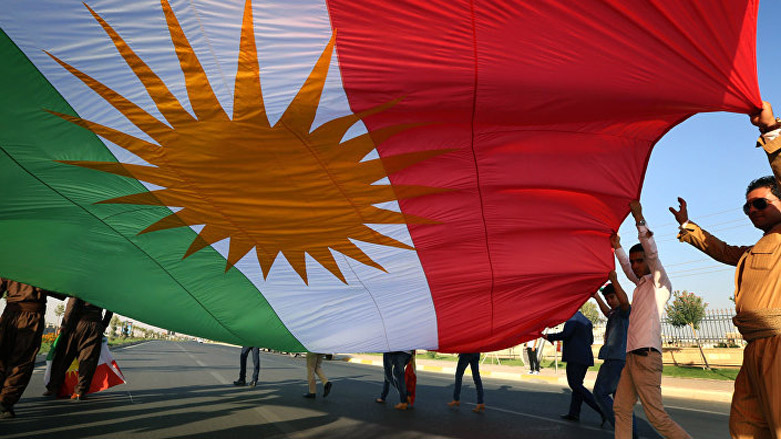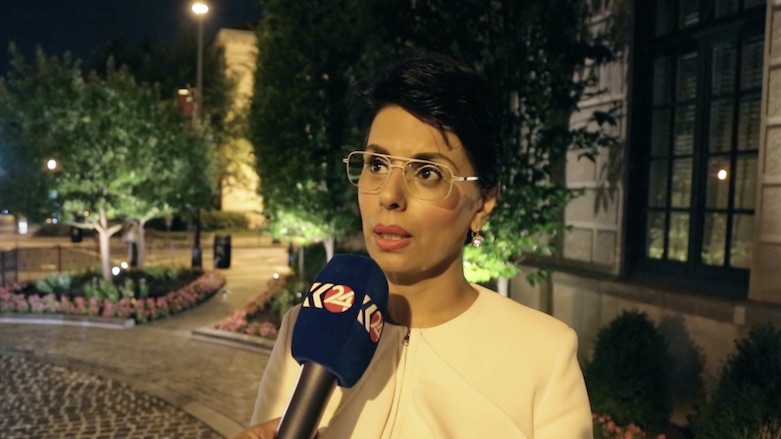From Kurdistan With Love: A message of hope for the US

As it rains this season in New York, the drizzle transports me back to the Qandil Mountains in the Zagros, and the extraordinarily brave people of Kurdistan whom I met recently and who have forever changed me.
Participating recently in an international genocide conference at the University of Duhok on the Islamic State’s (IS) genocide of Kurdistan’s Yezidi (Ezidi) people, I found seams of extraordinary beauty and humanity within the bosom of brutality.
Beyond the conference, I also found that for those I met in Kurdistan, the United States contains both the disappointment and hope of the Kurdish people.
Traveling to Iraq as an academic physician—not as an official diplomat—offering my medical expertise to survivors and academics of genocide, I knew the journey would be trying. What I hadn’t anticipated was my own transformation.
In a few days, I found a surprisingly profound human connection as an individual American–not as a government representative. I felt this often in my encounters but most acutely when I met a cadre of Peshmerga military officers, leaders among the famed Kurdish army who were eager to share their insights with me, though agreeing it would be without direct attribution.
My 10 days in Iraq earlier this spring preceded the US’ controversial engagement in the G7 Summit and the historic meeting in Singapore with President Donald Trump and North Korea’s Kim Jong-Un. It signals to me that across the world, perceptions of US leadership past and present are remarkably disparate.
Context of Kurdistan
Today, the most famous Kurds the world over are the Peshmerga, Kurdistan’s legendary army. They are the burgundy-bereted men and women who in 2014 went into hand-to-hand combat with IS and expelled them from Iraq in a three-year war ending in 2017.
Despite limited resources and heavy casualties, the Peshmerga (translates to “Those Who Face Death”) did what no other force has done: they defeated IS locally.
As an observing Muslim combating Islamism, I was particularly interested in meeting some of these Kurdish men and women who took bullets, suicide bombs, land mines, and grenades for defending not only the Ezidi people and Kurdistan, but the values of true Islam. Theirs is my Islam—the Islam that fights against Islamism, the evolutionary jihadism embodied by IS.
Certainly, I was attending a medical conference as an academic and participating in conversations, not as an official US envoy, but as a private American citizen. Nor was I entering these conversations a trained journalist, either. I made all of this clear to my friendly hosts. But I could see they saw me as a voice to my fellow Americans.
I wrestled with how to responsibly share this story and how to gain permission to represent a nation’s view of the US. I decided it was best that I listen intently and be accountable for accuracy of the views they shared.
In keeping with the Ministry of Peshmerga Affairs’ protocol, I was not allowed to identify the individual Peshmerga officers I spoke to, but I was allowed to share the summary of their views.
In these conversations, each person I met shared hopes Kurdistan would host American businesses and American trade. Kurdistan, they asserted, would willingly share her assets without the need for America to wage a war to secure them. All the Peshmerga, and all of Kurdistan wanted was nationhood and a profound desire to be even more allied with America. Each officer beseeched me to share their stories with the world and make their desires known.

The Effects of Recent History
Research shows that since the beginning of IS’ genocide in August 2014, over 7,000 Ezidis (a peaceful monotheistic sect among the Kurdish people) have been murdered. Thousands more Ezidi families were reportedly held hostage in their villages on peril of death if they refused conversion to Islam.
Seen as infidels by IS, this small Kurdish community reportedly experienced generational murder, forced conversion, sale and enslavement of Ezidi women, abortions of future generations of Ezidis, forced marriages (including child marriage), and sex-trafficking of Ezidi women and girls.
Since August 2014, 6,400 young Ezidi girls have reportedly been abducted, raped, and sold on Arab markets, later to be enslaved and killed. While 3,700 of these women have been liberated by Peshmerga operations, as of March 29 of this year, 2,700 Ezidi women and girls are still missing in IS captivity, according to Kheryi Bozani, the General Director of Ezidi Affairs.
Survival of the Ezidis is now in question; over 20,000 have fled to war-torn Syria. Another 30,000 have fled to Turkey and over 360,000 are internally displaced within Kurdistan in refugee camps. For a community worldwide to be estimated between 800,000 and one million this is devastating, particularly as Ezidism demands endogamy, or marriage within the community.
Kurdistan has been recorded in European travel logs for seven centuries. The Kurds are the world’s largest ethnic minority denied a homeland; today, over 30 million people identify as Kurdish.
For the last century, the Kurdish homeland has been divided between Turkey, Iran, Syria, the former USSR, and Iraq. Each country has continuously threatened either assimilation or extermination, even as each country is virulently opposed to their independence.
The Kurds know genocide only too well. Under the rule of Saddam Hussein, Kurds in Kurdistan were subject to heinous persecution; both Halabja and Anfal are known in the annals of genocide history. Hussein regularly and openly perpetuated genocide on the Kurds. In the town of Halabja in March 1988, 5,000 civilians were killed through aerial bombardment of mustard gas and nerve agents, including sarin.
Soon after, the Anfal Campaign targeted the population of Peshmerga-held districts in chemical warfare. The release of mustard gas killed a reported 182,000 as the first time in history a government used chemical weapons on its own people.
Forced disappearances of over 100,000 Kurds were ongoing and mass burials including while alive, as well as regional landmine campaigns designed to maim and kill – all were aimed to eradicate the Kurds. Only in 2010, did the Iraqi High Criminal Court recognize the Halabja massacre as an act of genocide.
Often subject to violence on the basis of ethnicity rather than religion, Kurds were persecuted by Muslims who see them as Kurds and not Muslims. And even though most Kurds are Sunni Muslims, Arabs see them as Kurds and not Sunni Muslims.
Independence from Iraq
Last fall, the Kurds held a referendum on independence from Iraq. In an overwhelming show of unity, 92 percent of all Kurds voted for independence from Iraq. With over 70 percent participation in the vote, Kurdistan was clear that secession from Iraq was the will of the people.
Iraq, recognizing the threat from an independent Kurdistan, deployed its military on the border between Kurdistan and central Iraq in October 2017. Some have claimed this assertion of independence cost Kurdistan oil-rich Kirkuk, as central Iraq seized it from Kurdistan.
It is with this backdrop that those I met with privately were intent upon relaying their sentiments about the urgency for Kurdistan’s independence from Iraq and the wish for US support.

My Peshmerga Hosts
The Director General for Health in the Duhok Province, Dr. Nezar Ismet, and my host in Kurdistan, appeared pleased to make the arrangements for me to meet with Peshmerga representatives when I asked him outright. I was most curious to meet the famed military that had defeated IS.
My visit had come at very short notice. I had asked Dr. Ismet about the visit only the afternoon before, and truthfully, I didn’t expect any access.
So, I was pleasantly surprised when I was informed at lunch the same day that a driver and translator were waiting to take me to the Peshmerga base in the Duhok city limits.
The base appeared to be in a quasi-residential area, and other than a sole soldier at a steel gate, it appeared unmarked. As we drove through the gates after being waved inside, it was apparent I was expected. I didn’t have any agenda and didn’t ask to see anyone in particular. I just wanted to meet the ground troops who had seen to the defeat of IS.
Accompanied by my translator, I engaged in six hours of intense dialogue in Kurdish, English, and Arabic with Peshmerga officers. These conversations imprinted on me a different view of Kurdistan than I anticipated.
Arriving after 4:00 p.m., it was before 11:00 p.m., when I left. From the outset, I was candid in explaining my academic medical role in Duhok but also my passion for traveling and sharing my discoveries in my writing through subjective opinion journalism.
Even though the University of Duhok had offered to pay for my travel and stay in Kurdistan, I declined to take money from a post-conflict region and instead paid all my own travel expenses, suggesting they reserve the funds for local attendees in financial hardship. I was pleased to see the University of Duhok honored this arrangement.
As we began talking with my Peshmerga hosts, I quickly discovered my various credentials had already been forwarded by Dr. Ismet to the military command before my invitation was confirmed. They knew of my travels to other countries in the region.
I explained I wrote in many news outlets around the world, but that I was not a reporter and didn’t represent a news agency or was paid to be there, even though I was widely published.
As a believing Muslim, I was at war with radical Islam and this was my major interest in meeting the Peshmerga. I wanted to meet those who had vanquished it from Iraq. I was transparent and forthright in explaining my desire to write about what I saw albeit from my own subjective observations, not as a reporter but as a storyteller.
As I described my travels to post-conflict regions in Pakistan where I also toured areas with the Pakistan military, I discovered my Peshmerga hosts were well informed on the Taliban and their activities in the SWAT valley where I had previously visited.
I was explicit in describing my many travels to the State of Israel also to learn about radical Islam and Israel’s experience with Islamism. My hosts, I discovered, had already read my published work about my activities there too.
We began with tea in one of the senior colonel’s offices and later was invited to meet the female Peshmerga who were standing in formation on the parade ground a short walk elsewhere on the base.
Though it had started to rain fairly heavily, we remained on the parade ground for some time. I was allowed to talk to the female soldiers and take photos with them. With the rain coming down harder, I suggested we go indoors.
I was amazed at their openness and passion to discuss IS, Kurdistan, and the remarkable culture of the Peshmerga. I learned there was a wait list of 5,000 to join the Peshmerga. Each potential Peshmerga is vetted by the army for his family background and personal qualities. Foremost to qualify as a Peshmerga, they told me, was the willingness to sacrifice not only on the battlefield but as evidenced by a family culture of service to others.
Many of the Peshmerga knew each other’s families, extended families, and related tribes in great detail. Potential Peshmerga cannot be prior felons or have any kind of criminal record, even if the debt to society is paid.
They repeated that the practice of serving others often at the expense of oneself is necessary before a solider is even considered to be trained as a Peshmerga. The sincerity of my hosts was palpable.
The Women of Peshmerga
I met men and women who carried the names of my own family members and felt a deep sense of recognition culturally and ethnically. Even when I learned more about their progressive interpretations of Islam, so much was familiar to me in unexpected ways.
No woman was veiled in the troops; they were dressed just like western combat troops. There was no demonstration at least that I could witness of subservience from the women or contempt from the men that is commonly found in deeply gender-segregated societies I have visited such as Saudi Arabia, Pakistan, Afghanistan, or Iran.
The notion that this may all be Kurdistan propaganda never struck me, even after deeply considering all I had heard and seen. The authenticity, candor, frankness, and vulnerability of the Peshmerga convinced me their intention was to allow me to see inside their world in the hours we would have together.

Two female Peshmerga lieutenants accompanied me with their commanding Colonel as I toured the base and met with the troops in the grounds. One lieutenant, a mother of three and a Peshmerga veteran of 24 years active duty, recounted her own battles in the field.
How had she left her children, I wondered, knowing IS was roaming Kurdistan.
She explained she had left her children with their father, adding that her children couldn’t ever be safe until their homeland of Kurdistan was safeguarded. With the full support of her family she left immediately for the frontlines with her battalion. With a dimpled smile, she explained she had killed two IS commanders.
The female officer’s superior, a Peshmerga colonel, explained the Peshmerga army remains profoundly proud of all soldiers—both women and men. The Peshmerga military fight shoulder to shoulder and considers itself gender neutral, I learned, sharing pride in all their troops as soldiers. Female lieutenants often command male troops, a position based on experience, seniority, and prowess.

Views of America
I was next taken to meet the Base Commander. Entering an inner sanctum of the base, at the end of a corridor, we were seated in an elegant living room.
The soft-spoken Base Commander with deep smile lines around his eyes greeted me courteously. His close circle of two colonels (one had accompanied me on the tour of the troops and another was responsible for the battalion’s financial logistics) had joined us along with female lieutenant commanders.
We discussed the Syrian war, the war with IS, US foreign policy, the economic trajectory of regional oil, and more. With precision, my Peshmerga hosts quoted President Richard M. Nixon and former United States Secretary of State and National Security Advisor Henry Kissinger.
Then, they schooled me on their views of America.
Far from weak, the Peshmerga officers explained, America is extraordinarily strong and hugely powerful. America, they explained, is in the region by choice. The US was here to protect her national interests; much like any other nation protects its interests. In America’s power, the Peshmerga saw neither intimidation nor mistrust, but instead, quite significant hope.
Unanimously, the Peshmerga officers repeatedly emphasized Kurdistan’s hope that the United States recognize their independence. They explained that an independent Kurdistan would deeply desire trade with the United States.
They never asked me to write an article or make a broadcast but I did ask them what Americans should know about the Peshmerga and the nation of Kurdistan and its people—the Kurds—they were fighting to protect from IS. I wanted to know, should I have the chance to address American readers and American viewers as I frequently do, how did they feel America had supported their difficult war effort? I wanted to be a conduit for these brave people to Americans back home.
I asked them of their experiences with the US during the war with IS. One Colonel was emphatic: America was perfectly complimentary to the Peshmerga, he explained. I learned that all three of the senior officers in that room had led hundreds into battle against IS, laid siege to IS for over a month and each had taken heavy losses of those under their command and in their rank.
As an untrained American civilian observer, I said that I felt America could have done more.

The Peshmerga had no need of US forces on the ground, they explained, emphasizing that the United States provided aerial cover exactly when the Peshmerga needed it. But their focus was on Kurdistan after the defeat of the most lethal threat that the world faces.
The Peshmerga defeated IS, the soft-spoken Base Commander began. He added how the entire world depended on the Peshmerga. And indeed, he emphasized, the Peshmerga were profoundly honored to fight for their land and their women and children.
But even after this enormous service, not only to the Kurdish people and the world, the Peshmerga continue to be regarded as a private security force. The Commander’s tone became steely: the Peshmerga are not a private security force, a militia to fight wars of others, they are a nation and a military.
We fell into a silence. I could not responsibly reply any opinion on behalf of the US.
It is a silence that is similar to the world’s silence to the Kurds in their quest for the right for independence. This was the true heartbreak of the Peshmerga, they told me, the heartbreak of all Kurdistan.

One of the Peshmerga Colonels drove me to my hotel after he and his wife had hosted me at their home for dinner.
In between drags on his cigarette, the Colonel spoke deliberately and thoughtfully of his people’s sadness that no one defended the Kurd’s desire of independence after the referendum, that no one was with the Peshmerga even as they stood with the world and defended the world’s interests against IS.
The Colonel explained his sadness that America did not support Kurdistan to become independent. He said even though America had not supported Kurdistan, Kurdistan remained America’s ally. Kurdistan was with America even now.
The Kurds are patient, he explained, and the Kurds continue to hope that one day America will support an independent Kurdistan.
It is now my hope as well.
Qanta A. Ahmed is a physician, author of "In the Land of Invisible Women," Council Member of the USC Shoah Foundation’s Visual History Institute and Member of the Council on Foreign Relations. Follow her on twitter @MissDiagnosis
The views expressed in this article are those of the author and do not necessarily reflect the position of Kurdistan 24.
Editing by Karzan Sulaivany


Main.jpg)
